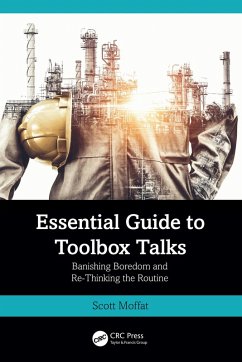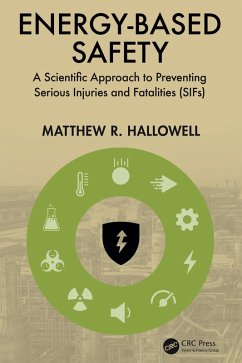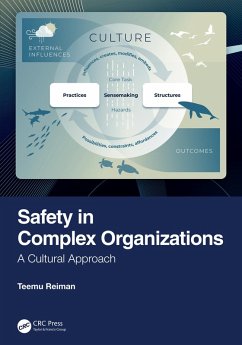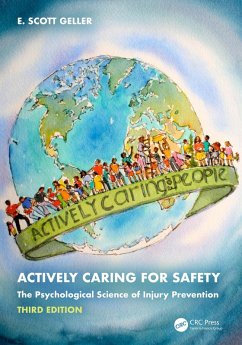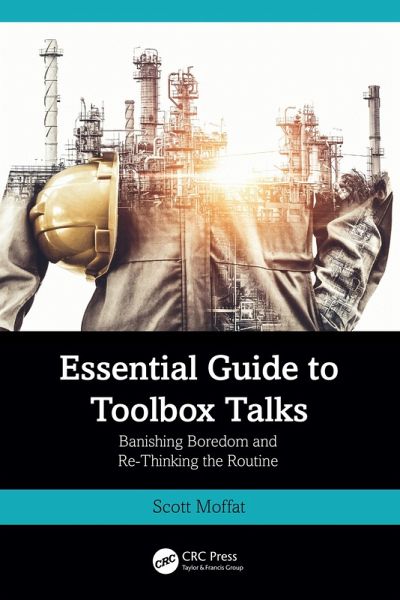
Essential Guide to Toolbox Talks (eBook, PDF)
Banishing Boredom and Re-Thinking the Routine

PAYBACK Punkte
10 °P sammeln!
A Toolbox Talk (TBT) is a pre- job task made to ensure all parties involved in a task have full understanding of what they should do. TBTs are not easy; however, the author hopes this book will provide the right guidance to make TBTs less daunting, and easier to use. They are not a tick- the- box exercise; therefore, please do not treat them as such. This book challenges this perception and puts forth a case to consider TBTs essential to delivering safe working environments, thereby providing a complete understanding of the task.Essential Guide to Toolbox Talks focuses on improving three Non- ...
A Toolbox Talk (TBT) is a pre- job task made to ensure all parties involved in a task have full understanding of what they should do. TBTs are not easy; however, the author hopes this book will provide the right guidance to make TBTs less daunting, and easier to use. They are not a tick- the- box exercise; therefore, please do not treat them as such. This book challenges this perception and puts forth a case to consider TBTs essential to delivering safe working environments, thereby providing a complete understanding of the task.
Essential Guide to Toolbox Talks focuses on improving three Non- Technical Skills (NTS) related to TBTs: Communication, Situation Awareness and Stress Management. With communication the book looks at the impact of inappropriate questions, allowing time for questions/ feedback, use of familiarities and knowing the answer and the errors that can occur. For situation awareness, the author conveys that effective communication enhances the environment in which people work, checking that the group understands the tasks; further coverage of what to do when things go wrong underpins this. Finally, it covers stress management and how important it is to confirm people know what to look for during a TBT and what to do if they believe a team member is under stress. With the onus on these three vital NTS, the reader will be able to deliver focused and much- improved TBTs that guarantee safe and effective performances in the workplace.
This neat and punchy book will change that tick- the- box perspective of the TBT. It will appeal to both practitioners in Human Factors and anyone at the front line in high- risk industries where TBTs are a requirement, especially those in oil and gas, nuclear, construction, logistics, transport and aviation who will be certain to consider it an essential guide.
Essential Guide to Toolbox Talks focuses on improving three Non- Technical Skills (NTS) related to TBTs: Communication, Situation Awareness and Stress Management. With communication the book looks at the impact of inappropriate questions, allowing time for questions/ feedback, use of familiarities and knowing the answer and the errors that can occur. For situation awareness, the author conveys that effective communication enhances the environment in which people work, checking that the group understands the tasks; further coverage of what to do when things go wrong underpins this. Finally, it covers stress management and how important it is to confirm people know what to look for during a TBT and what to do if they believe a team member is under stress. With the onus on these three vital NTS, the reader will be able to deliver focused and much- improved TBTs that guarantee safe and effective performances in the workplace.
This neat and punchy book will change that tick- the- box perspective of the TBT. It will appeal to both practitioners in Human Factors and anyone at the front line in high- risk industries where TBTs are a requirement, especially those in oil and gas, nuclear, construction, logistics, transport and aviation who will be certain to consider it an essential guide.
Dieser Download kann aus rechtlichen Gründen nur mit Rechnungsadresse in A, B, BG, CY, CZ, D, DK, EW, E, FIN, F, GR, HR, H, IRL, I, LT, L, LR, M, NL, PL, P, R, S, SLO, SK ausgeliefert werden.




